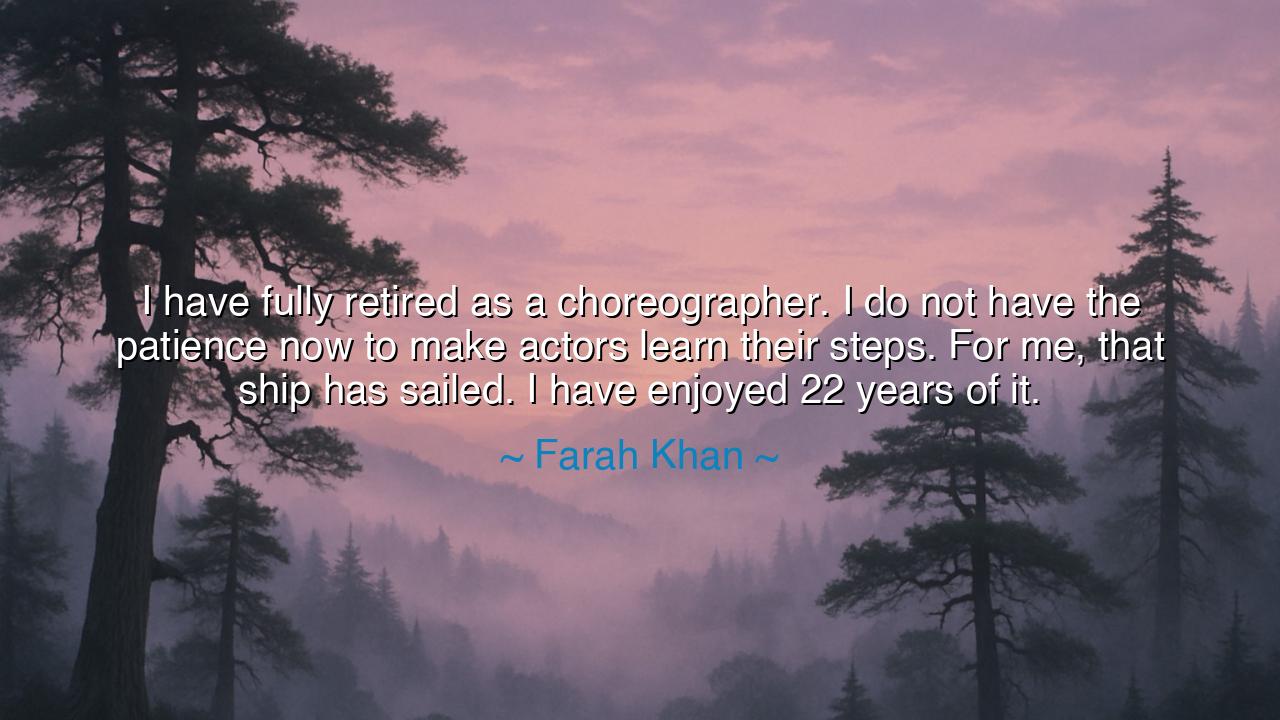
I have fully retired as a choreographer. I do not have the
I have fully retired as a choreographer. I do not have the patience now to make actors learn their steps. For me, that ship has sailed. I have enjoyed 22 years of it.






Hear the words of Farah Khan, spoken with the calm certainty of one who has given her strength to the art she loved: “I have fully retired as a choreographer. I do not have the patience now to make actors learn their steps. For me, that ship has sailed. I have enjoyed 22 years of it.” These words are not only a farewell but a testament, a closing of one chapter in a life well-spent, and a reminder that every journey has its season. She acknowledges both the beauty of what was and the wisdom of knowing when to step away.
For the heart of her reflection lies in patience, that golden virtue without which no teacher can endure. In her youth, she had the energy to mold actors, to repeat the same steps again and again until rhythm and grace were born. For twenty-two years she gave herself to this labor, shaping performances that thrilled audiences and carved her name into the story of cinema. But time brings change, and with it, the recognition that what once was joyous can grow heavy. To say the ship has sailed is not to mourn, but to honor the passing of an era and to look to the horizon for new journeys.
The ancients too knew this truth. The great general Cincinnatus, after saving Rome, returned to his farm, laying down power with dignity, saying that his task was done. So too did the philosopher Diogenes abandon the busy world to dwell in simplicity, declaring that he had no need for further striving. And in the East, the sage Lao Tzu is said to have departed into the mountains after writing his wisdom, choosing the quiet path when his service to the world was complete. In each, as in Khan, there is recognition of the natural rhythm of life: beginnings, flourishes, and endings.
Her words also remind us of the glory of endurance. For 22 years she bore the weight of repetition, of correction, of endless rehearsals under the lights and demands of cinema. Many would have faltered after a handful of years, but she endured two decades, shaping dances that became immortal. To retire after such labor is not defeat but victory, for she gave her art fully, then released it before bitterness could grow. This is the nobility of one who knows the value of both dedication and release.
Consider, by contrast, those who clung too long to their tasks, refusing to let go even when their spirit had grown weary. History is filled with rulers and artists whose later works bore not brilliance but strain, because they lacked the wisdom to say, Enough. Farah Khan’s farewell carries a different power—it is the voice of one who chooses her own ending, whose declaration that the ship has sailed is a mark of freedom, not regret.
The lesson, O seekers, is this: honor the seasons of your own life. Give yourself fully to your craft when passion and patience abound, but do not cling beyond the time appointed. There is dignity in beginnings, but there is also dignity in endings. To step away is not to abandon, but to make space for new roles, new joys, new ways of giving.
Practical counsel is clear: look within and ask—does my work still carry joy, or only burden? Do I give with fullness, or only out of habit? If the latter, then consider that perhaps your ship has sailed, and it is time to seek another harbor. Do not fear the change, for endings are also beginnings in disguise.
So let the words of Farah Khan resound not as resignation but as wisdom: “I have enjoyed 22 years of it.” For life is not measured by endless clinging but by the richness of the seasons we live. Give yourself to your calling, endure with patience, and when the time comes, step away with grace, knowing you have poured your spirit into the world and can now chart a new journey upon the open sea.






AAdministratorAdministrator
Welcome, honored guests. Please leave a comment, we will respond soon